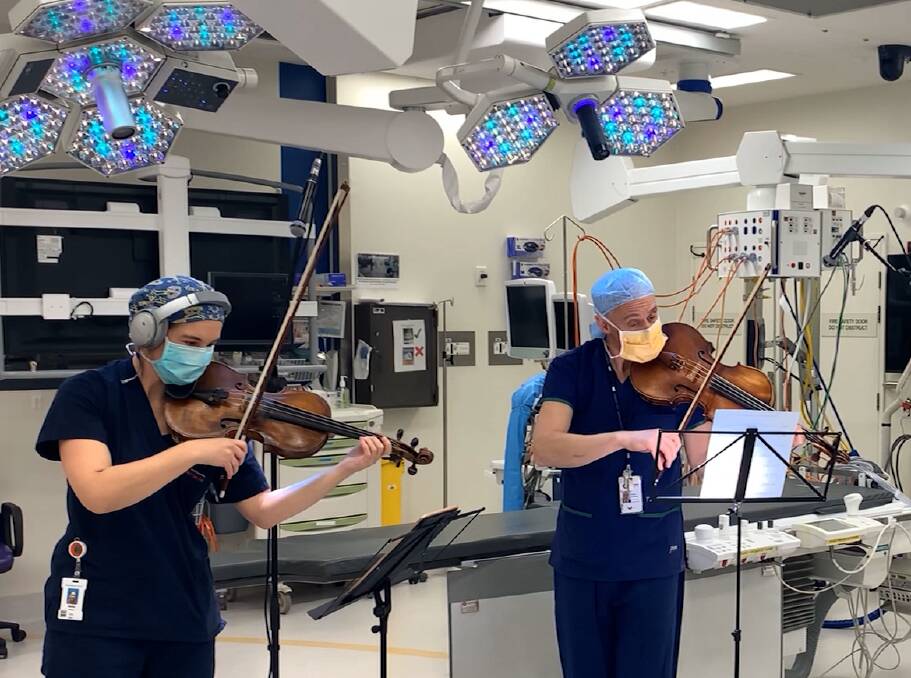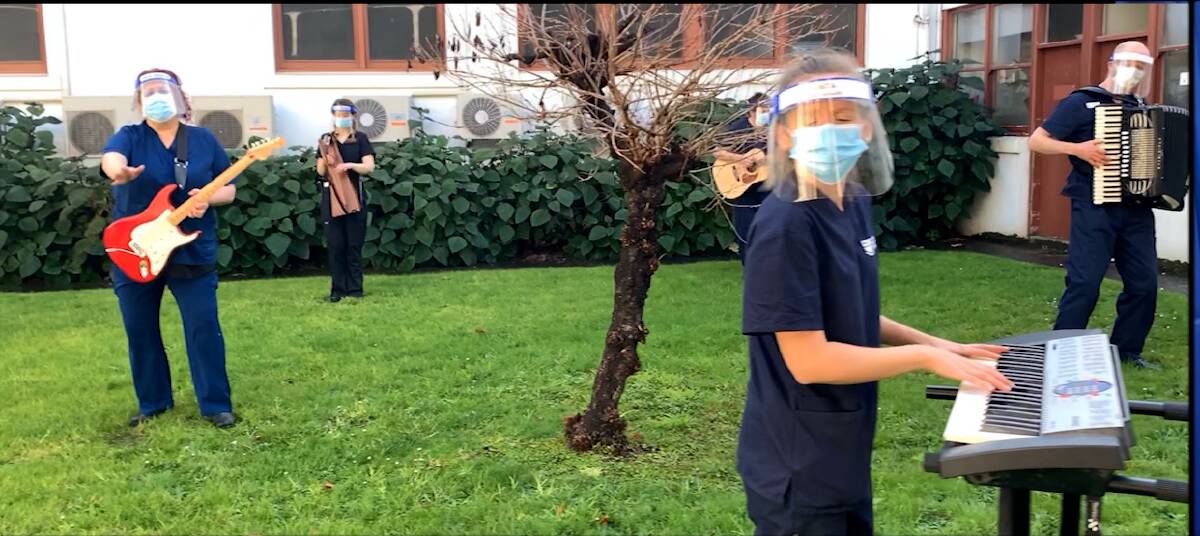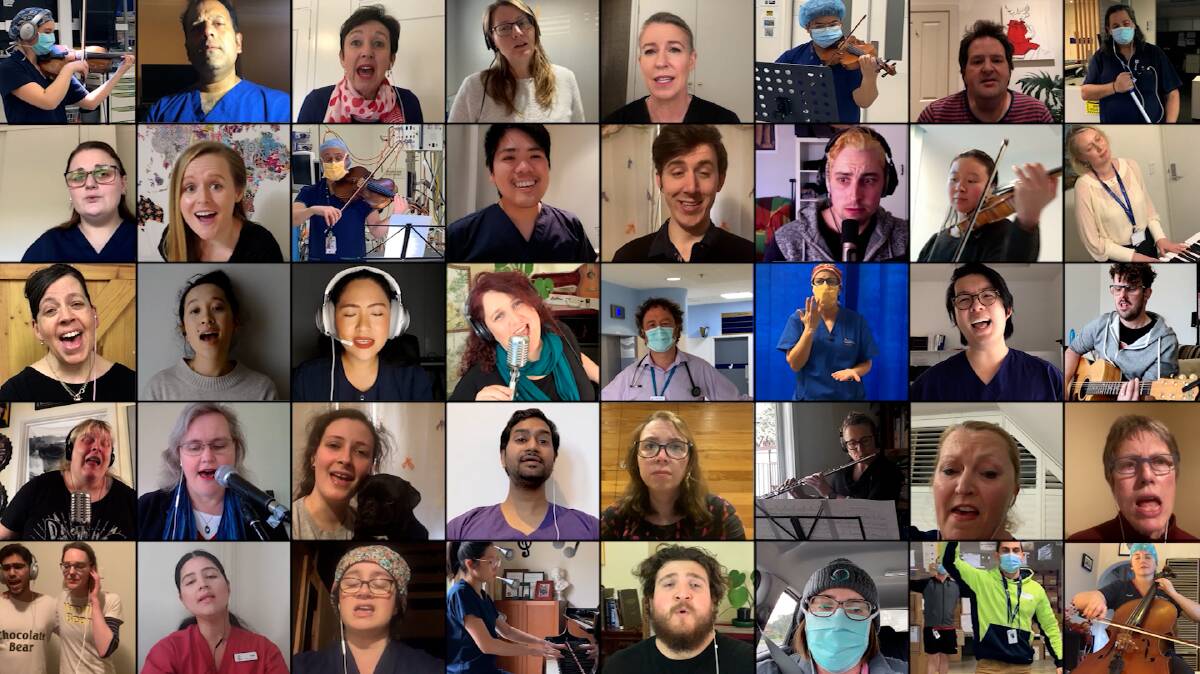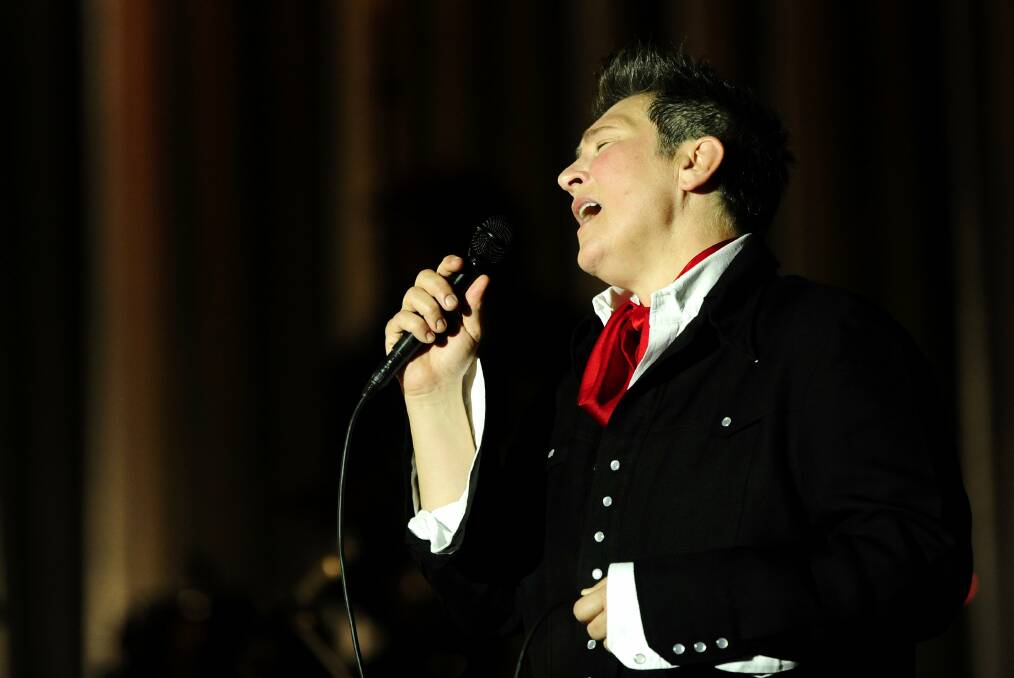“Music does a lot of things for a lot of people. It’s transporting … It’s uplifting, it’s encouraging, and it’s strengthening.” – Aretha Franklin, the Queen of Soul If you are finding things tough right now, you are not alone. We need to go easy on ourselves. Everyone has in some shape or form a degree of “pandemic anxiety and fatigue”. It’s a real thing. Some people have lost so much, lost loved ones, lost their sense of self. It’s also possible you might even have some “motivation fatigue”. However, we still need to find ways to let the stress go, to reconnect, and be kind to ourselves and others as we navigate our way through this. As the Head of Music Therapy and Scrub Choir at The Royal Melbourne Hospital, I have experienced on the frontline how music can transform us, how it can lift our spirits, help us recover, and support us as a lifelong companion through the most difficult of times. Most people have a connection to music, and you may already be using music to help pass the time, clean up, jog that little bit further, or drift off to sleep. I want to encourage you to keep doing those things and to give you some tips that have worked for us on the frontline, and that I’ve used at home to help manage my home and work life. Perhaps the most notable hospital music for well-being project we have embarked on during the pandemic is the Scrub Choir. Formed in 2020 with 500-plus members, our public releases have been reaching out to the community and using the power of singing, albeit virtually together, to help keep us connected, to reduce our stress and to celebrate small moments of joy. You can watch I’ll Stand By You on YouTube. Music is great for big and small moments of joy. It can help reframe our day and experiences and provide us with a space to take a rejuvenating breath. With restrictions in many states in Australia, those bigger shared moments, such as seeing your favourite band live, are not possible. As we are missing these big shared experiences that can be so good for our health and wellbeing, we need to find other ways of feeling connected in music. Small moments of joy in music, accumulated across your day can be very beneficial, and manageable when your motivation may be low, or you are just plain exhausted. We facilitate and capture small moments of joy in music in Scrub Choir projects in hospital corridors, or on our lunch breaks outside, and they have a positive ripple effect across our days. So, perhaps take a moment to dance to your favourite tune in your hallway or kitchen, and/or think or talk about a good memory linked to music as you listen to it. That might give you and your loved ones just the lift you need. Scrub Choir involves singing. This is done virtually from home and has been a powerful stress release for so many of our staff as they have come home after a long demanding shift. We still need to be mindful that singing can generate more aerosols than speaking, as can shouting and cheering. So, what is happening in your household will influence whether singing is OK without a mask. Hopefully you can sing on your own safely or with your household – wherever you are in Australia. Singing is a great all-body engagement, deepening your breath, resonating through your chest and head, and is a powerful way to express emotions. The most beautiful voices are the ones that sing from the heart. Enjoy your singing. Even a nice gentle hum can really settle you and help you face the stressors in your day. Clinically, singing is being used to help people rehabilitate after COVID. I’m lucky to share the joy of singing with both my adult children, and my daughter’s partner, who are artists/performers/creators. Yes, sometimes our kitchen is a little bit like a scene from a musical! We spontaneously create songs. No topic is too silly, and we love to sing in harmony. This really sustained me as we entered the pandemic world we now live in. Writing down your thoughts and creating song lyrics can also be a very therapeutic. At the Royal Melbourne Hospital we did this en masse, with staff contributing more than 250 comments about their experiences in 2020. This led to the creation of three songs that reflect on that time. You can hear these songs on Spotify or Apple. Many of us have been separated from our loved ones for too long. Singing on Zoom works well for the person you are singing to – and with. We have done remote sessions in music therapy like this. The timing lag is challenging but if you are singing to your loved one – for example, your grandparents – and they join in, their experience will be perfectly in time, and you’ll see the joy on their faces. If you have musicians in your family and someone who is tech savvy, you can use free Apps like Bandlab, to make your own family and friends into a virtual choir. If you do create one, please contact me to let me know. I would love to hear it!) In the hospital we have developed safe protocols with our medical colleagues, plus wearing PPE, to continue live music for our patients and staff because it is so vital to sustain us through the intense pressure we are under in healthcare. We have even played at our public vaccination hub to help reduce stress, help the long lines seem shorter and as a positive acknowledgement to the community coming out to be vaccinated. If you learn an instrument or sing, I encourage you to find solace and be uplifted and transported by your instrument and voice. Sometimes that’s by playing your favourite piece or expressing your emotions through improvisation. For those of you who don’t already play an instrument, it is never too late to learn. You can even make your own shakers at home from objects around the house for a rhythmic jam. As Scrub Choir continues to grow, we have recently added another aspect to our music therapy – a podcast engaging with musicians and personalities about their own music and well-being. We call it Scrub Sessions and you can find it online at thermh.org.au/scrub-sessions In our first episode Sadako Pointer, granddaughter of one of the original Pointer Sisters, talks beautifully about her life in music and how experiences performing in the past have given her courage to face lots of different challenges in her life. The beauty of music is that it can “modulate” you and travel alongside you. It has positive effects on our emotions and it can be an outlet and release. Depending where we are at emotionally, it can be so powerful that it can bring us down. So, sometimes we need to be very mindful of our music choices. Mostly though it can help us and transport us away from feelings of sadness, frustration and confinement. Music choice, is of course, very personal, but I have shared here some ideas to help guide you when you are listening to music. Create different playlists for different moods. A lot of streaming services do this for you, but the actual act of creating one for yourself can be therapeutic. There is a lot to be said for making time to reflect on what you like and dislike, on what sorts of songs or symphonies lift your spirits, what’s going to get you moving, and what is your go-to cry-on-the-couch track. Yes, letting it all out is definitely a good idea! You might even make a personal playlist for a friend or family member as a gift. In music therapy when we play live music, we often use the iso-principle, which basically works on the premise that humans like being in sync with each other and with music. So, when playing live, we change the rhythm and pulse of our music to match someone, or the energy of a room, and then potentially transform that energy. If an individual is stressed in a heightened state, we would play their favourite with a quicker pulse or beat than usual and then gradually slow down to help match and move them – to help them settle their breath and help them let go. That’s why sometimes when you are really stressed, and someone puts on super smooth relaxing music you might feel even more stressed. It’s not matching you where you are at. Think about that when creating your playlist. Are you wanting to unwind? Start with a song that’s got more movement and slowly change the songs to choose pieces that progressively make you feel more settled. Or do the opposite if you are looking to recharge. I have assembled here a playlist drawn from the music I often use to enhance my mood. I’ve chosen songs that are gentle and still and then I move on to more uplifting ones. Across the three phases, it’s a pretty eclectic mix. Sometimes I go for groove, sometimes for the lyrics, sometimes for the personal association with a particular piece of music. New music comes out every day and I love exploring new sounds or listening to an artist’s full album. If you are looking for more musical inspiration, we also have a Royal Melbourne Hospital Spotify profile you can jump on. It has lot of genres, Scrub Choir favourites and relaxing tunes and some letting-go playlists too. Music can sustain us, comfort us, inspire us, uplift us and rebuild us. I hope you find some time to really immerse yourself in your music and to connect with others in music. Music can transform your day, so be bold and create with music, sing and play your heart out, find solace and comfort and quiet in your music, and actively live the soundtrack of your life. Simply put, music is so very good for you. Phase 1: Soothing music that helps me to let out a big sigh K.D Lang – Golden Slumbers/The End (Originally by the Beatles. As featured in the Happy Feet soundtrack.) Israel Kamakawiwoole – Over the rainbow David Bowie – Space Oddity Jane Siberry – Calling all Angels Olafur Arnalds – Old Skin (feature Arnor Dan) Phase 2: Transition tracks that are uplifting and have a bit more of a groove Eivor – Silvitni The Pretenders – Hymn to Her Gordi – Extraordinary Life Keane – Somewhere only we know Cosmo Sheldrake – Come Along Phase 3: Songs that energise me and bring on a smile Two Door Cinema Club – Sun Loreen – Euphoria Angelique Kidjo – Wombo Lombo Pnau – Go Bang (feat Kira Divine) Earth Wind and Fire – September
“Music does a lot of things for a lot of people. It’s transporting … It’s uplifting, it’s encouraging, and it’s strengthening.”
– Aretha Franklin, the Queen of Soul
If you are finding things tough right now, you are not alone.
Some people have lost so much, lost loved ones, lost their sense of self. It’s also possible you might even have some “motivation fatigue”.
As the Head of Music Therapy and Scrub Choir at The Royal Melbourne Hospital, I have experienced on the frontline how music can transform us, how it can lift our spirits, help us recover, and support us as a lifelong companion through the most difficult of times.
Most people have a connection to music, and you may already be using music to help pass the time, clean up, jog that little bit further, or drift off to sleep.
Hospital staff share their talents. Picture: supplied
I want to encourage you to keep doing those things and to give you some tips that have worked for us on the frontline, and that I’ve used at home to help manage my home and work life.
Perhaps the most notable hospital music for well-being project we have embarked on during the pandemic is the Scrub Choir. Formed in 2020 with 500-plus members, our public releases have been reaching out to the community and using the power of singing, albeit virtually together, to help keep us connected, to reduce our stress and to celebrate small moments of joy. You can watch I’ll Stand By You on YouTube.
Ready please, Dr Music: some sound advice for beating the Covid blues
/images/transform/v1/crop/frm/vuJmMAkyxKfBpiJqjiHTXS/0e3aca1c-a2eb-412e-880a-cde427b5516a.jpg/r5_0_1915_1079_w1200_h678_fmax.jpg
She knows the healing power of music, so we asked DR EMMA O’BRIEN, head of music therapy at Royal Melbourne Hospital, for her playlist to ease our pandemic fatigue.
news, latest-news,
2021-10-03T00:00:00+10:00
https://players.brightcove.net/3879528182001/default_default/index.html?videoId=6275025608001
https://players.brightcove.net/3879528182001/default_default/index.html?videoId=6275025608001
Music is great for big and small moments of joy. It can help reframe our day and experiences and provide us with a space to take a rejuvenating breath.
With restrictions in many states in Australia, those bigger shared moments, such as seeing your favourite band live, are not possible. As we are missing these big shared experiences that can be so good for our health and wellbeing, we need to find other ways of feeling connected in music.
Small moments of joy in music, accumulated across your day can be very beneficial, and manageable when your motivation may be low, or you are just plain exhausted.
We facilitate and capture small moments of joy in music in Scrub Choir projects in hospital corridors, or on our lunch breaks outside, and they have a positive ripple effect across our days.
So, perhaps take a moment to dance to your favourite tune in your hallway or kitchen, and/or think or talk about a good memory linked to music as you listen to it. That might give you and your loved ones just the lift you need.
We still need to be mindful that singing can generate more aerosols than speaking, as can shouting and cheering. So, what is happening in your household will influence whether singing is OK without a mask. Hopefully you can sing on your own safely or with your household – wherever you are in Australia.
Singing is a great all-body engagement, deepening your breath, resonating through your chest and head, and is a powerful way to express emotions. The most beautiful voices are the ones that sing from the heart. Enjoy your singing. Even a nice gentle hum can really settle you and help you face the stressors in your day.
A clip from the choir’s rendition of I’ll Stand By You. Picture: Supplied
Clinically, singing is being used to help people rehabilitate after COVID. I’m lucky to share the joy of singing with both my adult children, and my daughter’s partner, who are artists/performers/creators.
Yes, sometimes our kitchen is a little bit like a scene from a musical! We spontaneously create songs. No topic is too silly, and we love to sing in harmony. This really sustained me as we entered the pandemic world we now live in.
Writing down your thoughts and creating song lyrics can also be a very therapeutic. At the Royal Melbourne Hospital we did this en masse, with staff contributing more than 250 comments about their experiences in 2020. This led to the creation of three songs that reflect on that time. You can hear these songs on Spotify or Apple.
Many of us have been separated from our loved ones for too long. Singing on Zoom works well for the person you are singing to – and with. We have done remote sessions in music therapy like this. The timing lag is challenging but if you are singing to your loved one – for example, your grandparents – and they join in, their experience will be perfectly in time, and you’ll see the joy on their faces.
If you have musicians in your family and someone who is tech savvy, you can use free Apps like Bandlab, to make your own family and friends into a virtual choir. If you do create one, please contact me to let me know. I would love to hear it!)
In the hospital we have developed safe protocols with our medical colleagues, plus wearing PPE, to continue live music for our patients and staff because it is so vital to sustain us through the intense pressure we are under in healthcare.
We have even played at our public vaccination hub to help reduce stress, help the long lines seem shorter and as a positive acknowledgement to the community coming out to be vaccinated.
Music can transform your day, so be bold and create with music, sing and play your heart out, find solace and comfort and quiet in your music, and actively live the soundtrack of your life.
If you learn an instrument or sing, I encourage you to find solace and be uplifted and transported by your instrument and voice. Sometimes that’s by playing your favourite piece or expressing your emotions through improvisation.
For those of you who don’t already play an instrument, it is never too late to learn. You can even make your own shakers at home from objects around the house for a rhythmic jam.
In our first episode Sadako Pointer, granddaughter of one of the original Pointer Sisters, talks beautifully about her life in music and how experiences performing in the past have given her courage to face lots of different challenges in her life.
A clip from the choir’s rendition of I’ll Stand By You. Picture: Supplied
The beauty of music is that it can “modulate” you and travel alongside you. It has positive effects on our emotions and it can be an outlet and release. Depending where we are at emotionally, it can be so powerful that it can bring us down. So, sometimes we need to be very mindful of our music choices. Mostly though it can help us and transport us away from feelings of sadness, frustration and confinement.
Create your own soundtrack
Music choice, is of course, very personal, but I have shared here some ideas to help guide you when you are listening to music.
Create different playlists for different moods. A lot of streaming services do this for you, but the actual act of creating one for yourself can be therapeutic. There is a lot to be said for making time to reflect on what you like and dislike, on what sorts of songs or symphonies lift your spirits, what’s going to get you moving, and what is your go-to cry-on-the-couch track. Yes, letting it all out is definitely a good idea!
You might even make a personal playlist for a friend or family member as a gift. In music therapy when we play live music, we often use the iso-principle, which basically works on the premise that humans like being in sync with each other and with music.
So, when playing live, we change the rhythm and pulse of our music to match someone, or the energy of a room, and then potentially transform that energy. If an individual is stressed in a heightened state, we would play their favourite with a quicker pulse or beat than usual and then gradually slow down to help match and move them – to help them settle their breath and help them let go.
A clip from the choir’s rendition of I’ll Stand By You. Picture: Supplied
That’s why sometimes when you are really stressed, and someone puts on super smooth relaxing music you might feel even more stressed. It’s not matching you where you are at. Think about that when creating your playlist. Are you wanting to unwind? Start with a song that’s got more movement and slowly change the songs to choose pieces that progressively make you feel more settled. Or do the opposite if you are looking to recharge.
I have assembled here a playlist drawn from the music I often use to enhance my mood. I’ve chosen songs that are gentle and still and then I move on to more uplifting ones. Across the three phases, it’s a pretty eclectic mix. Sometimes I go for groove, sometimes for the lyrics, sometimes for the personal association with a particular piece of music.
New music comes out every day and I love exploring new sounds or listening to an artist’s full album.
If you are looking for more musical inspiration, we also have a Royal Melbourne Hospital Spotify profile you can jump on. It has lot of genres, Scrub Choir favourites and relaxing tunes and some letting-go playlists too.
Music can sustain us, comfort us, inspire us, uplift us and rebuild us. I hope you find some time to really immerse yourself in your music and to connect with others in music.
Music can transform your day, so be bold and create with music, sing and play your heart out, find solace and comfort and quiet in your music, and actively live the soundtrack of your life.
Simply put, music is so very good for you.
- Dr Emma O’Brien OAM is Head of Music Therapy and Scrub Choir at The Royal Melbourne Hospital.
Dr Emma’s mood-enhancing playlist
Phase 1: Soothing music that helps me to let out a big sigh
K.D Lang – Golden Slumbers/The End (Originally by the Beatles. As featured in the Happy Feet soundtrack.)
Israel Kamakawiwoole – Over the rainbow
David Bowie – Space Oddity
Jane Siberry – Calling all Angels
Olafur Arnalds – Old Skin (feature Arnor Dan)
K.D. Lang performing at the AIS Arena in 2011. Picture: Stuart Walmsley
Phase 2: Transition tracks that are uplifting and have a bit more of a groove
The Pretenders – Hymn to Her
Gordi – Extraordinary Life
Keane – Somewhere only we know
Cosmo Sheldrake – Come Along

The Pretenders lead singer Chrissie Hynde performing at the Royal Theatre in Canberra in 2010. Picture: Melissa Adams
Phase 3: Songs that energise me and bring on a smile
Two Door Cinema Club – Sun
Angelique Kidjo – Wombo Lombo
Pnau – Go Bang (feat Kira Divine)
Earth Wind and Fire – September
Pnau’s Peter Mayes on guitar, singer Nick Littlemore performing in Newcastle in 2009. Picture: Jonathan Carroll
© The Canberra Times
Views: 4






